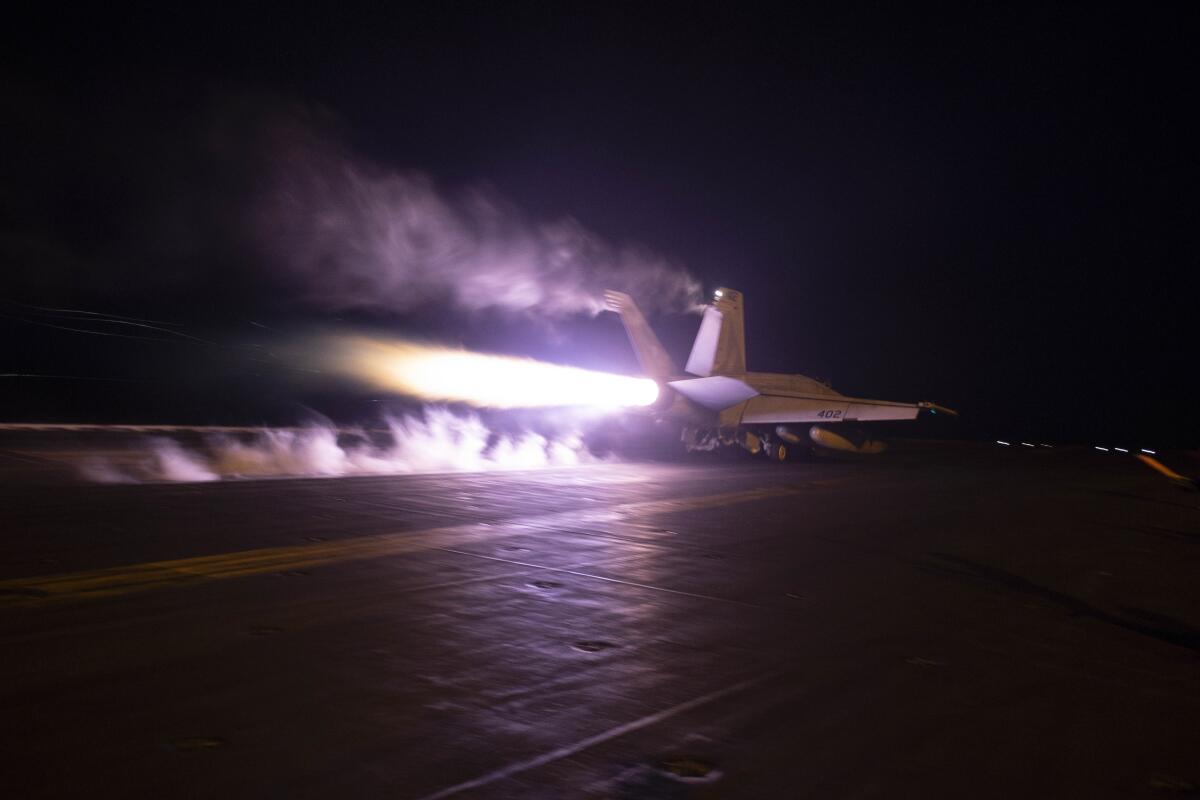U.S., U.K. strike Houthi sites in Yemen in response to surge in Red Seat attacks on ships

- Share via
WASHINGTON — The U.S. and Britain struck 18 Houthi targets in Yemen on Saturday, answering a recent surge in attacks by the Iran-backed militants on ships in the Red Sea and Gulf of Aden, including a recent missile strike that set fire to a cargo vessel.
According to U.S. officials, American and British fighter jets hit sites in eight locations, targeting missiles, launchers, rockets, drones and air-defense systems. The officials spoke on condition of anonymity to provide early details of the ongoing military operation.
This is the fourth time since Jan. 12 that the U.S. and British militaries have conducted a joint operation against the Houthis. But the U.S. has also been carrying out almost daily strikes on Houthi targets such as incoming missiles and drones aimed at ships, as well as weapons that were prepared to launch.
The U.S. F/A-18 fighter jets launched from the USS Dwight D. Eisenhower aircraft carrier in the Red Sea, officials said.
“The United States will not hesitate to take action, as needed, to defend lives and the free flow of commerce in one of the world’s most critical waterways,” said U.S. Defense Secretary Lloyd J. Austin III. “We will continue to make clear to the Houthis that they will bear the consequences if they do not stop their illegal attacks.”
The Houthis denounced the “US-British aggression,” saying in a statement that they would respond “with more qualitative military operations against all hostile targets in the Red and Arabian Seas in defense of our country, our people and our nation.”
The U.S., U.K., and other allies said in an earlier statement that the “necessary and proportionate strikes specifically targeted 18 Houthi targets across 8 locations in Yemen” that included underground storage facilities, radar and a helicopter.
U.K. Defense Secretary Grant Shapps said Royal Air Force Typhoon jets engaged in “precision strikes” aimed at degrading Houthi drones and launchers. Shapps said the strikes came after “severe Houthi attacks against commercial ships in the Red Sea and Gulf of Aden, including against the British-owned MV Islander and the MV Rubymar, which forced the crew to abandon ship.”
The strikes have support from a wider coalition that includes Australia, Bahrain, Canada, Denmark, the Netherlands and New Zealand.
President Biden and other senior leaders have repeatedly warned that the U.S. won’t tolerate the Houthi attacks against commercial shipping. But the counterattacks haven’t appeared to diminish the Houthis’ campaign against shipping in the region, which the militants say is over Israel’s war against Hamas in the Gaza Strip.
Teenage friends Angelina, who is Palestinian, and Adar, who is Jewish Israeli, talk about the Hamas attacks on Israel and Israel’s war on Gaza. ‘It’s OK to disagree.’
“Our aim remains to de-escalate tensions and restore stability in the Red Sea, but we will once again reiterate our warning to Houthi leadership: we will not hesitate to continue to defend lives and the free flow of commerce in the face of continued threats,” Saturday’s statement said.
The Houthis have launched at least 57 attacks on commercial and military ships in the the Red Sea and Gulf of Aden since Nov. 19, and the pace has picked up in recent days.
U.S. Central Command also said Saturday that a Houthi attack on the Rubymar, a Belize-flagged ship, on Feb. 18 had caused an 18-mile oil slick, and warned of the danger of a spill from the vessel’s cargo of fertilizer.
The British-registered, Lebanese-operated cargo vessel was attacked while sailing through the Bab el-Mandeb Strait, which connects the Red Sea and the Gulf of Aden.
The missile attack forced the crew to abandon the vessel, which had been on its way to Bulgaria from the United Arab Emirates. It was transporting more than 41,000 tons of fertilizer, according to a Central Command statement.
Yemen’s internationally recognized government called on Saturday for other countries and maritime-protection organizations to quickly help address the oil slick and avert an environmental disaster.
Associated Press writer Samy Magdy in Cairo contributed to this report.
More to Read
Sign up for Essential California
The most important California stories and recommendations in your inbox every morning.
You may occasionally receive promotional content from the Los Angeles Times.














